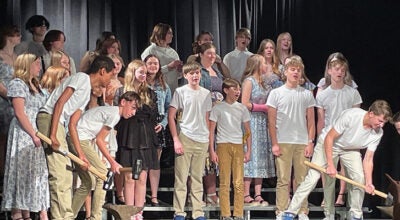The Hormel Institute scientist receives grant to study ways to prevent lung cancer progression
Published 6:22 pm Tuesday, January 24, 2023

- Luke Hoeppner, PhD. Photo provided
|
Getting your Trinity Audio player ready...
|
Luke Hoeppner, PhD, Associate Professor and leader of the Cancer Biology research section at The Hormel Institute, University of Minnesota, has received a grant from the Lung Cancer Research Foundation in partnership with lung cancer patient advocacy group, EGFR Resisters. The $150,000 grant will allow Hoeppner and his team to study predictive biomarkers and new therapeutic strategies to prevent drug resistant lung cancer progression.
Non-small cell lung cancer (NSCLC) is the leading cause of cancer-related death in the United states and worldwide. In most cases, patients are not diagnosed until the disease is advanced and the prognosis is poor. NSCLC patients benefit from treatment with EGFR tyrosine kinase inhibitors (TKIs). While EGFR inhibitor drugs work very well for the first several years of treatment, many patients eventually develop resistance to EGFR TKIs and the cancer then progresses rapidly.
“Molecules that can predict drug resistance, and therapies that prevent EGFR TKI–refractory progression, are urgently needed,” said Hoeppner. “To develop new therapies to overcome EGFR TKI resistance, we need to understand better how EGFR TKI resistance arises.”
This grant allows Hoeppner and his team to continue moving forward on their research focused on discovering how lung cancer becomes resistant to EGFR targeted therapy.
“The short-term impact of our work is understanding mechanisms of resistance to treatment, which will help us to predict and prevent EGFR-targeted therapy resistance. The long-term impact of our work lays the foundation for the development of new predictive markers to assist physicians and patients make the best treatment decisions. Successful completion of the studies has the potential to lead to breakthroughs in predicting and preventing progression of EGFR TKI–refractory lung cancer and may lead to future clinical trials to treat NSCLC,” said Hoeppner.
This research project started with philanthropic funding from a Windfeldt Cancer Research Award, which allowed Hoeppner and his team to collect the preliminary data necessary to secure the Lung Cancer Research Foundation grant. Community funded pilot studies like the Windfeldt Cancer Research Award are essential for scientists to develop early ideas to the point where they compete successfully for larger grants such as those awarded by external sources like the Lung Cancer Research Foundation, National Institutes of Health, and the Department of Defense.
“Support from Tom and Carol Windfeldt was instrumental in being awarded this new grant. Without their support, we would not have been able to launch this project and obtain the proof of concept data that was essential to be awarded Lung Cancer Research Foundation funding,” Hoeppner said.
The Hormel Institute’s Sk. Kayum Alam, PhD, and Li Wang, PhD, also made key contributions to the studies that secured this grant funding and will continue to play an important role in this research. Hoeppner’s grant funding started Dec. 1, 2022 and will continue for two years.





